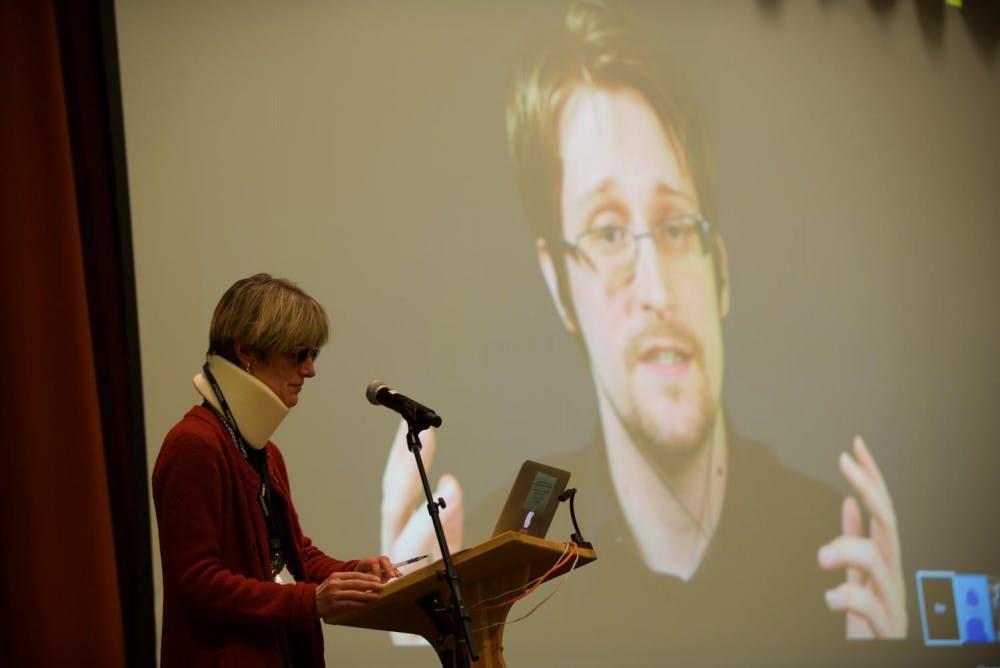On Thursday, March 16, Edward Snowden, a former National Security Agency (NSA) contractor who leaked classified information in an effort to expose widespread government surveillance, spoke over videoconference to Middlebury College community members in Wilson Hall as the Middlebury College Activities Board (MCAB) Spring Speaker. This was the first time that students gathered in Wilson Hall to hear a speaker after Charles Murray visited on
Snowden fled the United States in May 2013, and was later charged by the U.S. government with espionage and theft of government property. He currently resides at an undisclosed location in Russia, where he received renewed asylum in January 2017 for an additional three years.
Allison Stanger, Russell Leng ’60 Professor of International Politics and Economics, introduced Snowden and moderated the event. Stanger began by describing the effect Snowden has had on her upcoming book, Life, Liberty, and the Pursuit of Leaks: The Story of Whistleblowing in America, which was near completion when Snowden’s story broke. “He forced me, more or less, back to square one,” she said, “but it will be a better book, I hope, for the extra effort.”
In his own opening remarks, Snowden said that the problem at hand involves more than the NSA’s activity. “The problem is that this has become easy for anyone with a certain amount of resources,” he said. While government surveillance programs were once costly and cumbersome, Snowden shared that contemporary programs have grown far more efficient. “One guy can track, with precision, an unimaginably large number of people. And that was me,” he said, referring to his work at the NSA.
Snowden criticized the government for participating in surveillance programs that “are not only unlawful, but have always been unconstitutional.” Moreover, he argued that the government misrepresents its justification for the very existence of the programs. “These programs do not and have not saved lives… These programs were never about terrorism,” he said. “[Surveillance] is useful for disrupting social movements, in being able to discredit people whose politics we disagree with... [These programs] are about economic espionage, diplomatic manipulation, and social control.”
Lamenting a lack of effective mechanisms for constitutional oversight, Snowden cited the press and a vigilant public as vehicles that could bring about greater government transparency. “My argument is that we are at this point forced to rely on our press... If we only knew what governments or corporations wanted us to know, we wouldn’t know much at all.” He continued, “If we didn’t have investigative journalism, we wouldn’t be talking about [this].”
Throughout his talk, Snowden articulated a message of empowerment, imploring the audience to remember that “Saying something matters…the reality is one voice can change the world.” He warned against the notion that freedom of privacy is not important if one has nothing to hide, arguing that “Privacy is the foundation of all other rights… if we lose that, we’re losing more than a right; we’re losing ourselves.”
Snowden also stressed the importance of recognizing the relationship between rights and privilege. “Rights don’t mean much to the powerful and the privileged,” he said. “Rights matter to those who are different, to those who stand out… If you say surveillance is okay as long as its not monitoring me, this is selfish and short sighted.
Snowden was careful to explain that he never personally published any documents in his 2013 reveal. Rather, he gave the information to professional journalists, and requested that they contact the U.S. government in advance of publication to ensure that each leak would not put anyone in danger. To Snowden’s knowledge, that process was followed in every case, and “they have never shown any evidence that anyone has come to harm as a result of these disclosures.” Instead, his actions “changed our laws, changed the thinking of the president, [and] won the Pulitzer Prize for public service. I believe that we live in a freer and fairer world because of it,” he said.
Emma Dunlap ’18 and Jocelyn Zemach ’18, co-chairs of the MCAB Speakers Committee, worked with an agent to secure Snowden as Spring Speaker. “We generally use an agent for our larger speakers,” Dunlap wrote in an email. “Our committee unanimously decided to ‘bring’ Edward Snowden to Middlebury believing that he would start an interesting conversation on campus, especially given the current political climate in America, U.S.-Russian relations, and cyber security concerns in general.”
According to Dunlap, “The event reached over 500 viewers on the live stream. I’ve received positive feedback from many attendees and I hope that the Middlebury community continues to discuss the ideas and opinions that Snowden brought.”
Rebecca Simon ’19 had a somewhat different opinion after leaving Wilson Hall, questioning whether Snowden came to Middlebury to push an agenda rather than engage in a discussion. “Though most of what he had to say was rather inspiring for young people to hear, it all seemed like an elaborate plan or a previously constructed lecture on why his position was correct,” she said. “I am so happy I waited 90 minutes in the cold to see him interact with Professor Stanger and students…I just thought that the discussion was going to be a discussion and not a lecture.”
Snowden Talks Surveillance and Security in U.S.

Comments



